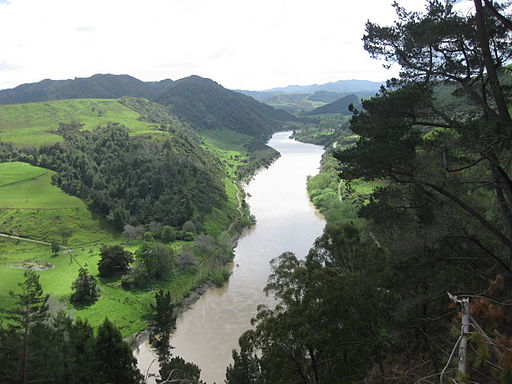
March 23, 2017; The Conversation
To paraphrase former Massachusetts governor and presidential aspirant Mitt Romney, now “rivers are people, too.” That’s the conclusion of two nations widely disparate in cultural norms and geographic location, India and New Zealand. Both have endowed select riparian bodies with certain rights of persons.
India’s Uttarakhand high court on Monday, March 20, 2017, ruled that the highly polluted Ganga and Yamuna rivers, sacred in the Hindu faith, have the legal rights of humans in an attempt to craft a legal framework to foment their cleaning and preservation. The Whanganui River (Te Awa Tupua) in New Zealand has been endowed with legal personhood by legislation that is the culmination of years of negotiations under the Treaty of Waitangi between local Māori and the New Zealand government, a formal declaration respecting the intimate bond between the Māori and the river.
Essentially, these rivers have been granted standing to sue in court, which is not an equivalent to human rights but a subset that’s ideally capable of staving off further ecological harm by letting them protect themselves through legal action. Letting natural bodies seek redress for wrongs has effect only when an actual person is appointed as guardian to represent its interests and where both the guardian and users understand their respective rights and responsibilities. However, perhaps most important (and tenuous) of all, what is needed here are a sure pot of money and independence from government institutions—accessible funds to pay for the expensive costs of lawyers and litigation and the means of protecting itself when, as will often occur, that protection runs afoul of the political interests of government.
While the concept of legal rights of personhood for bodies in nature sounds noble and powerful, the meaningfulness of those pronounced rights is demonstrated by the quality of the established legal mechanisms playing out in the real world of competing interests. New Zealand’s system may be more robust and better thought out; it establishes a guardianship of two members—one appointed by the Whanganui Iwi (local Māori people), and the other by the New Zealand government—and funds have been set aside for health maintenance of the river. However, water rights are not covered, which may prove significant, since the Tongariro Power Scheme, a hydroelectric project operated by Genesis Energy NZ, draws substantial volume. In contrast, the Uttarakhand state high court has drawn a protection scheme by ruling that the two treasured rivers, the Ganga and Yamuna, are to be treated as minors by law and will be parented in effect by three entities: the director general of the Namami Gange project, and the Uttarakhand chief secretary and advocate general. As opposed to the eight years spent carefully crafting a hierarchy to support the rights of the river in New Zealand, the Uttarakhand high court has ordered boards charged with cleaning and maintaining the two sacred rivers to be established in eight weeks.
Sign up for our free newsletters
Subscribe to NPQ's newsletters to have our top stories delivered directly to your inbox.
By signing up, you agree to our privacy policy and terms of use, and to receive messages from NPQ and our partners.
This notion of legal personification is not new; it has been brewing among environmental protection advocates for decades. In 1972, legal scholar Christopher Stone’s groundbreaking article “Should Trees Have Standing—Toward Legal Rights for Natural Objects” was published, and as far as Western jurisprudence is concerned, Stone innovatively argued that to protect nature, it must not be viewed as a commodity or resources to be mined, bought and sold, but should be empowered with the same legal protections and access to the courts that actual persons ideally enjoy. Kiana Herold, in “The Rights of Nature: Indigenous Philosophies Reframing Law,” discussed Stone’s article’s thesis:
Under capitalist economic logic, many externalities that negatively impact the environment are not registered when calculating the cost of an action. Transforming nature legally from mere property to a rights-holding entity would force byproduct environmental effects of production to factor into cost calculations. Under this framework, nature would be better protected.
Herold also cited Ecuador’s innovative 2008 Constitution that established the rights of nature such that, “Under Ecuadorian law, people can now sue on the ecosystem’s behalf, without it being connected to a direct human injury.” Herold’s central point was that man and nature are equals and fully integrated according to many indigenous cultures, not requiring law to rescue the environment from degradation and commodification. Herold cites the harmonious “Sumak Kawsay” concept of the Quechua, or Kichwa, people of Ecuador as an example of something that predates codified protection: “The Kichwa notion of ‘Sumak Kawsay,’ or ‘buen vivir’ in Spanish, translates roughly to good living in English. It expresses the idea of harmonious, balanced living among people and nature.”
There is no accident that law is catching up to tradition, as perhaps the earth is reaching a tipping point of inhabitability due to the noxious practices of industry and mercantilism, which are normally no friends of nature. Allowing three rivers to hire lawyers won’t change much of the perverse progress of commerce, but it may be a start.—Louis Altman













